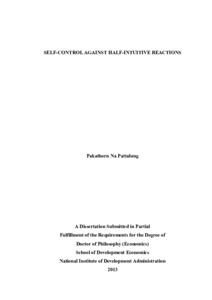Self-control against half-intuitive reactions
(National Institute of Development Administration, 2013)
People often make everyday decisions based on their intuition. A large number of experiments in Neuroeconomics and Behavioral Economics draw this conclusion without providing explanations on the reaction-generating processes. These intuitive reactions are efficient and appropriate in many situations. However, when the issue at stake concerns immediate rewards; intuitive reactions usually lead to suboptimal results. In fact, these continued reaction patterns may breed bad habits and act as endogenous constraints to one’s making an optimal choice…



